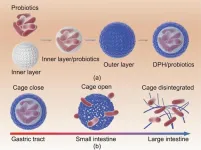(Press-News.org) Forget walking 10,000 steps a day. Taking at least 50 steps climbing stairs each day could significantly slash your risk of heart disease, according to a new study from Tulane University.
The study, published in Atherosclerosis, found that climbing more than five flights of stairs daily could reduce risk of cardiovascular disease by 20%.
Atherosclerotic cardiovascular disease (ASCVD) along with coronary artery disease and stroke are the leading causes of morbidity and mortality worldwide.
“Short bursts of high-intensity stair climbing are a time-efficient way to improve cardiorespiratory fitness and lipid profile, especially among those unable to achieve the current physical activity recommendations,” said co-corresponding author Dr. Lu Qi, HCA Regents Distinguished Chair and professor at the Tulane University School of Public Health and Tropical Medicine. “These findings highlight the potential advantages of stair climbing as a primary preventive measure for ASCVD in the general population.”
Using UK Biobank data collected from 450,000 adults, the study calculated participants’ susceptibility to cardiovascular disease based on family history, established risk factors and genetic risk factors and surveyed participants about their lifestyle habits and frequency of stair climbing. Median follow-up time was 12.5 years.
The study found that climbing more stairs daily especially reduced risk of cardiovascular disease in those who were less susceptible. However, Qi said the increased risk of heart disease in more susceptible people could be “effectively offset” by daily stair climbing.
Qi touted the public availability of stairs as a low-cost, accessible way to incorporate exercise into daily routines.
“This study provides novel evidence for the protective effects of stair climbing on the risk of ASCVD, particularly for individuals with multiple ASCVD risk factors,” Qi said.
END
Walking more than five flights of stairs a day can cut risk of heart disease by 20%, study says
2023-09-28
ELSE PRESS RELEASES FROM THIS DATE:
Global team recommends ethical rules for human research in commercial spaceflight
2023-09-28
The first ethical framework for conducting human research on commercial spaceflight was proposed today in an article in Science by an international team that included Hastings Center president Vardit Ravitsky. Ravitsky’s contribution focused on promoting diversity among the researchers and participants, which is essential to ensuring the research benefits society at large.
Human research on commercial spaceflight is expected to expand significantly in the near future, and yet there are no rules for ...
Ultrasound may rid groundwater of toxic ‘forever chemicals’
2023-09-28
COLUMBUS, Ohio – New research suggests that ultrasound may have potential in treating a group of harmful chemicals known as PFAS to eliminate them from contaminated groundwater.
Invented nearly a century ago, per- and poly-fluoroalkyl substances, also known as “forever chemicals,” were once widely used to create products such as cookware, waterproof clothing and personal care items. Today, scientists understand that exposure to PFAS can cause a number of human health issues such as birth defects and cancer. But because the bonds inside these chemicals don’t break down easily, they’re notoriously ...
Intravenous immunoglobulin may prevent severe infections associated with anti-BCMA therapy for multiple myeloma
2023-09-28
Bottom Line: Intravenous immunoglobulin (IVIg) reduced the risk of severe infections by 90% in patients with multiple myeloma undergoing treatment with an anti-BCMA bispecific antibody.
Journal in Which the Study was Published: Blood Cancer Discovery, a journal of the American Association for Cancer Research (AACR)
Author: Guido Lancman, MD, a clinical associate at the Princess Margaret Cancer Centre of the University Health Network and an adjunct assistant professor at the University of Toronto
Background: Bispecific antibodies targeting the BCMA ...
Innovative double-layer polysaccharide hydrogel revolutionizes intestine-targeted oral delivery of probiotics
2023-09-28
In a groundbreaking study, a research team led by Changhu Xue and Xiangzhao Mao from the Ocean University of China has developed a remarkable double-layer polysaccharide hydrogel (DPH) that promises to revolutionize the field of intestine-targeted oral delivery of probiotics. The team’s findings, published in Engineering, demonstrate the potential of DPH to enhance the bioavailability, intestinal colonization, and overall effectiveness of probiotics in treating various diseases.
The research team’s study focused on addressing the challenges posed by the harsh gastrointestinal environment and the short retention ...
Ethics rules needed for human research on commercial spaceflights, panel says
2023-09-28
New guidelines are needed to assure that research on human subjects performed on commercial spaceflights is conducted ethically, a panel of experts say in a commentary appearing in the September 28 issue of the journal Science.
Their paper is titled Ethically cleared to launch?
Private companies are expected to fly thousands of people into space in the coming decades. Those aboard will include workers and passengers who will have the opportunity to participate in research studies. Such research is not only essential to assure the safety of future space travelers but often also addresses critical issues of human health in general.
Buț ...
A few essential genetic differences tailor flowers to bee or hummingbird pollinators
2023-09-28
Large differences in flower characteristics between wildflowers with different pollinators are achieved by a few key genetic differences, according to a study by Carolyn Wessinger at the University of South Carolina, US, and colleagues, publishing September 28th in the open access journal PLOS Biology.
Plants that rely on animal pollinators, such as insects or birds, have evolved distinctive suites of flower characteristics — known as “pollination syndromes” — that are tailored to the pollinator. For example, most plants in the ...
Dartmouth study removes human bias from debate over dinosaurs' demise
2023-09-28
To help resolve the scientific debate over whether it was a giant asteroid or volcanic eruptions that wiped out the dinosaurs and most other species 66 million years ago, Dartmouth researchers tried a new approach — they removed scientists from the debate and let the computers decide.
The researchers report in the journal Science a new modeling method powered by interconnected processors that can work through reams of geological and climate data without human input. They tasked nearly 130 processors with analyzing the fossil record in reverse to pinpoint the events and conditions that led to the Cretaceous–Paleogene (K–Pg) extinction event that ...
Cleared to launch? Ethical guidelines needed for human research in commercial spaceflight
2023-09-28
HOUSTON – (Sept. 28, 2023) – The commercial spaceflight industry is expanding opportunities for scientific research in space, but the industry needs clear ethical guidelines before human research is ready for liftoff. In a new policy paper published in Science, a global, multidisciplinary team of bioethicists, health policy experts, space health researchers, commercial spaceflight professionals and government regulators outlines potential ethical concerns facing the future of commercial space research and provides guiding principles ...
Genome-wide study of staghorn coral identifies genomic markers of disease resistance
2023-09-28
A genome-wide survey of highly endangered staghorn coral in the Caribbean has identified 10 genomic regions associated with resilience against white band disease – an emergent infectious disease responsible for killing up to 95% of Caribbean Acropora species, including staghorn corals (A. cervicornis). The findings could be used as a conservation tool to improve disease resistance in the wild and nursery stocks of staghorn corals used to repopulate damaged coral reefs throughout Caribbean waters. Over the last several decades, Earth’s reef corals have experienced unprecedented declines. Increased anthropogenic ...
Uncovered: the source of sticking power and virulence for an emerging fungal pathogen
2023-09-28
A previously uncharacterized adhesin protein specific to a human fungal pathogen first discovered in 2009 plays a crucial role in the fungus’s ability to colonize a variety of living and non-living surfaces, and in its virulence, according to a new study. “These findings [about Candida auris] offer insight into the genetics and molecular mechanisms by which [this fungus] mediates surface association, a trait critical to the increasing disease burden of this emerging pathogen,” write the authors. Since its first discovery in 2009, C. auris has become increasingly responsible for life-threatening infections in health care facilities worldwide. Outbreaks of ...


